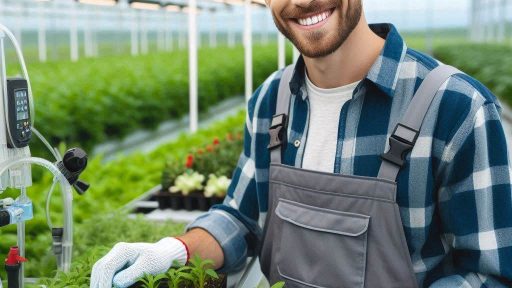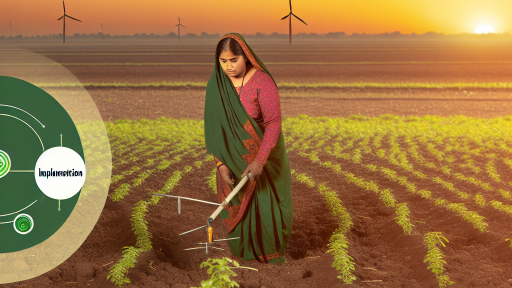Introduction
Climate change is drastically impacting our food supply, posing serious threats to global food security.
Understanding these effects is crucial for sustainable food production.
Impact on Agriculture
Rising temperatures and erratic weather patterns are affecting crop yields and productivity.
Droughts, floods, and pests are becoming more prevalent.
Shifts in Growing Seasons
Climate change is causing shifts in growing seasons, disrupting the timing of planting and harvesting.
Farmers are struggling to adapt to these changes.
Water Scarcity Challenges
Changing precipitation patterns are leading to water scarcity in many agricultural regions.
This is affecting irrigation and crop quality.
Threats to Food Diversity
Climate change is also endangering food diversity by impacting the growth of various crops.
This could lead to a decrease in nutritional quality and availability.
Impacts on Livestock
Livestock farming is facing challenges as extreme heat stress and disease outbreaks increase.
This affects meat and dairy production.
Adapting to Climate Change
Efforts to mitigate climate change impacts on food supply include sustainable farming practices, crop diversification, and water management strategies.
Basically, climate change poses a significant risk to our food supply.
Addressing these challenges requires collective action and sustainable solutions.
Changes in Weather Patterns
Climate change is causing more frequent and extreme weather events, impacting crop production and food availability.
- Increased frequency of droughts affects water availability for irrigation, leading to lower crop yields.
- Extreme heatwaves can damage crops, reducing their quality and quantity for consumption.
- Changes in precipitation patterns result in flooding, which destroys crops and disrupts supply chains.
Impact on Crop Production
The erratic weather patterns caused by climate change are creating significant challenges for farmers around the world.
- Unpredictable rainfall patterns make it difficult for farmers to plan their planting and harvesting schedules.
- Warmer temperatures can also favor the proliferation of pests and diseases, further compromising crop yields.
- Extreme weather events like hurricanes and cyclones can devastate entire agricultural regions, causing food shortages.
Food Availability
As a result of climate change-induced weather patterns, food availability is increasingly becoming a concern for global food security.
- Shortages in crop production lead to higher food prices, making essential items less affordable for low-income populations.
- Limited access to nutritious foods can result in malnutrition and related health issues among vulnerable communities.
- Disruptions in food supply chains due to extreme weather events can lead to food deserts in certain regions.
In short, the changes in weather patterns driven by climate change are posing serious challenges to our food supply.
It is crucial for governments, organizations, and individuals to work together to mitigate these effects and ensure a sustainable future for food production and availability.
Impact on Crop Yields
Climate change has a direct impact on crop yields due to its effects on temperature, precipitation, and extreme weather events.
- Decreased crop yields are observed in regions experiencing prolonged droughts, which can lead to water stress for plants.
- Excessive rainfall can also be detrimental to crops, causing flooding and waterlogged soil that suffocates roots.
- Rising temperatures can affect the flowering and fruiting processes of plants, reducing overall crop production.
- Changes in temperature and rainfall patterns can disrupt the natural pollination process, affecting fruit and seed development.
Examples of specific crops that are being affected by changing climate conditions
Specific crops that are being directly affected by changing climate conditions include:
- Wheat: Higher temperatures can reduce wheat yields as it affects grain development and quality.
- Coffee: Changes in temperature and rainfall patterns can lead to reduced coffee production in certain regions.
- Rice: Changes in water availability due to altered precipitation patterns can impact rice yields.
- Maize: Prolonged droughts can significantly reduce maize yields, affecting food security in many regions.
- Apples: Erratic weather conditions can disrupt apple tree flowering and fruiting cycles, lowering crop yields.
Overall, the direct impact of climate change on crop yields is a growing concern for global food security and agricultural sustainability.
Transform Your Agribusiness
Unlock your farm's potential with expert advice tailored to your needs. Get actionable steps that drive real results.
Get StartedFood Security Issues
Climate change is a major factor contributing to food insecurity globally.
The impact of extreme weather events, rising temperatures, and changing rainfall patterns are challenging food production and distribution systems.
- Crop Failures: Changing weather patterns lead to crop failures, affecting food supplies and prices.
- Water Scarcity: Droughts caused by climate change reduce water availability, impacting agriculture and food production.
- Disrupted Supply Chains: Extreme weather events like storms and floods disrupt transportation and distribution of food.
Vulnerable Populations at Risk
Vulnerable populations, such as low-income communities, women, children, and the elderly, are particularly at risk of food shortages due to climate change.
- Low-Income Communities: These groups may lack resources to adapt to changing food prices and availability.
- Women and Children: They often bear the brunt of food insecurity, facing malnutrition and health issues.
- Elderly Population: Seniors are more susceptible to food shortages and health problems associated with malnutrition.
Addressing food security issues in the face of climate change requires a multi-faceted approach.
Governments, organizations, and individuals must work together to implement sustainable solutions that ensure food security for all.
By investing in resilient agriculture practices, promoting climate-smart farming techniques, and supporting vulnerable populations, we can mitigate the impact of climate change on our food supply and build a more secure future for everyone.
Read: Solar Farms Shine: A New Era in Agriculture
Disruption of Food Supply Chains
How climate change is disrupting food supply chains
Climate change is disrupting food supply chains in various ways, impacting the overall availability and pricing of food products.
Here is an analysis of how these disruptions are occurring and the potential consequences they may have:
1. Extreme Weather Events
Extreme weather events, such as hurricanes, droughts, and floods, are becoming more frequent due to climate change.
These events can damage crops, disrupt transportation routes, and lead to food shortages.
For example, a hurricane can destroy entire fields of crops, leading to a decrease in supply.
Additionally, flooded roads may make it difficult for trucks to transport food to supermarkets, causing delays and potentially leading to price increases.
2. Changes in Growing Conditions
Climate change is also altering growing conditions for crops.
Shifts in temperature and precipitation patterns can affect the timing of planting and harvesting, as well as the overall yield of crops.
For instance, if the temperature rises significantly during the growing season, it may cause crops to mature faster or become more susceptible to pests and diseases.
This can result in reduced crop yields, leading to lower supply levels and higher prices for consumers.
3. Impact on Food Storage and Preservation
As the climate changes, food storage and preservation methods may also be affected.
Warmer temperatures can accelerate the spoilage of perishable foods, while increased humidity can create ideal conditions for mold and bacteria growth.
This can lead to a higher rate of food waste along the supply chain, reducing the overall availability of food products.
In turn, this scarcity can drive up prices as demand exceeds supply.
4. Disruption of Trade Routes
Climate change is disrupting trade routes, making it difficult for food products to reach their intended destinations.
Rising sea levels and more frequent storms can damage ports and infrastructure, hindering the transport of goods.
Additionally, changes in ocean currents and wind patterns can impact shipping routes, leading to delays in food shipments.
These disruptions can cause shortages in certain regions and an increase in transportation costs, ultimately affecting the availability and pricing of food items.
5. Potential Consequences on Food Availability and Pricing
The disruptions in food supply chains caused by climate change can have significant consequences on food availability and pricing.
Decreased supply levels due to crop damage, transportation delays, and storage issues can lead to food shortages in markets.
When the demand for food exceeds the available supply, prices tend to increase as sellers capitalize on the scarcity.
This can result in food insecurity for vulnerable populations who may struggle to afford essential food items.
All in all, climate change is actively disrupting food supply chains, impacting food availability and pricing.
As extreme weather events become more common and growing conditions change, the resilience of the global food system is being tested.
It is crucial for policymakers, businesses, and consumers to take proactive measures to mitigate the effects of climate change on food supply chains and ensure a sustainable and secure food future for all.
Read: Flood-Proof Farms: Stories of Innovative Adaptation

Adaptation Strategies
Potential adaptation strategies for farmers and food producers
When it comes to dealing with the impacts of climate change on food supply, farmers and food producers need to be proactive in implementing adaptation strategies.
Here are some potential ways to adapt:
1. Diversification of Crops
One effective strategy is to diversify the crops grown on farms.
By planting a variety of crops, farmers can reduce the risk of total crop failure due to climate-related events such as droughts or floods.
This can help ensure a more stable food supply even in changing climate conditions.
2. Water Management
Proper water management is crucial for agriculture, especially in the face of climate change.
Implementing efficient irrigation systems, rainwater harvesting, and water conservation techniques can help farmers adapt to changing precipitation patterns and ensure consistent water supply for crops.
3. Soil Conservation
Maintaining healthy soil is essential for crop productivity and resilience to climate change.
Practices such as no-till farming, cover cropping, and crop rotation can help prevent soil erosion, improve soil health, and increase the capacity of soil to retain water, nutrients, and carbon.
4. Investment in Research and Technology
Research and technological innovation play a vital role in developing climate-resilient agriculture.
Investing in new technologies, such as precision agriculture, genetic engineering, and weather forecasting tools, can help farmers adapt to changing climate conditions and improve productivity.
5. Adoption of Sustainable Practices
Embracing sustainable agricultural practices is crucial for mitigating the impacts of climate change on food supply.
Practices such as organic farming, agroforestry, and integrated pest management can help reduce greenhouse gas emissions, conserve natural resources, and enhance ecosystem resilience.
6. Collaboration and Knowledge Sharing
Collaboration among farmers, researchers, policymakers, and other stakeholders is essential for developing effective adaptation strategies.
Knowledge sharing, capacity building, and collaboration platforms can help disseminate best practices, innovative solutions, and climate information to support farmers in adapting to climate change.
7. Policy Support and Incentives
Government policies and incentives play a crucial role in promoting climate-resilient agriculture.
Policies that support sustainable practices, provide financial incentives for adopting green technologies, and enhance access to climate-smart agriculture resources can help farmers overcome barriers to adaptation and build more resilient food systems.
8. Resilience Building
Building resilience in agriculture is key to adapting to climate change.
By strengthening the resilience of agroecosystems, communities, and supply chains, farmers can better withstand climate-related shocks and stresses, ensure food security, and sustain livelihoods in the long run.
Overall, adopting adaptation strategies that promote sustainability, resilience, innovation, and collaboration is essential for safeguarding food supply in the face of climate change.
By implementing proactive measures and working together to address the challenges posed by climate change, farmers and food producers can ensure a more secure and resilient food supply for future generations.
Read: Drought-Resilient Crops: Farmers’ New Allies
Showcase Your Farming Business
Publish your professional farming services profile on our blog for a one-time fee of $200 and reach a dedicated audience of farmers and agribusiness owners.
Publish Your ProfileRole of Government Policies
In addressing the impact of climate change on food supply, government policies play a crucial role.
These policies are designed to mitigate the effects of climate change on agriculture and ensure food security for the population.
- Government policies are essential in providing guidelines and regulations for farmers and food producers to adopt sustainable practices.
- These policies can incentivize the adoption of climate-smart agriculture techniques that are resilient to changing climatic conditions.
- By implementing policies that support sustainable agriculture, governments can help mitigate the negative impacts of climate change on food production.
- Government interventions can also focus on improving infrastructure such as irrigation systems, storage facilities, and transportation networks to enhance food supply resilience.
- Policies that prioritize research and development in agriculture can lead to the creation of new technologies and practices that increase food production efficiency.
Need for Policies Supporting Sustainable Agriculture and Food Security
There is a growing recognition of the need for policies that promote sustainable agriculture and ensure food security in the face of climate change.
These policies are essential for long-term food production sustainability.
- Sustainable agriculture practices help conserve natural resources, reduce greenhouse gas emissions, and enhance soil health, leading to increased food production.
- Government policies that support sustainable farming methods enable farmers to adapt to changing climate conditions and maintain productivity levels.
- Ensuring food security through policies that facilitate access to nutritious and affordable food is crucial for the well-being of the population.
- By investing in programs that promote local food production and distribution, governments can reduce reliance on imports and enhance food sovereignty.
- Policies that focus on enhancing resilience to climate change impacts in the agricultural sector are vital for ensuring food availability and accessibility.
Read: Navigating Climate Policy: US Farmers’ Guide
Consumer Awareness and Action
Importance of consumer awareness in addressing food supply challenges
The importance of consumer awareness in addressing food supply challenges cannot be understated.
As consumers, we have the power to influence the way our food is produced and sourced.
By making informed choices, we can support sustainable food systems and help mitigate the impact of climate change on our food supply.
- Consumer Awareness is Key
- When consumers are informed about the implications of their food choices, they can make decisions that align with their values and priorities.
- Understanding the environmental, social, and ethical impacts of food production is essential for making conscious choices.
- Consumers have the power to drive change by supporting businesses and practices that prioritize sustainability and responsible sourcing.
Make informed food choices and support sustainable food systems
Make informed food choices and support sustainable food systems by:
- Researching the sources of their food: Knowing where your food comes from can help you determine its environmental and ethical implications.
- Choosing locally grown and seasonal produce: Supporting local farmers reduces the carbon footprint of your food and strengthens the community.
- Opting for organic and regeneratively grown products: These practices promote soil health, biodiversity, and long-term sustainability.
- Reducing food waste: By planning meals, using leftovers creatively, and composting, consumers can minimize their impact on the environment.
- Supporting sustainable food brands and initiatives: Investing in companies and projects that promote sustainability can drive positive change in the food industry.
By raising awareness and taking action, consumers can play a crucial role in shaping a more sustainable and resilient food supply chain.
Together, we can make a difference in mitigating the effects of climate change on our food system.
Conclusion
It is evident that climate change poses a significant threat to our food supply.
Rising temperatures, extreme weather events, and shifting growing seasons are already impacting crop yields and food production globally.
It is crucial for us to recognize the urgency of this issue and take action to mitigate its effects.
By reducing our carbon footprint, supporting sustainable farming practices, and advocating for policies that address climate change, we can help safeguard our food supply for future generations.
It is essential to collaborate with farmers, policymakers, and communities to adapt to the changing climate and ensure food security for all.
It is in our best interest to prioritize sustainable and resilient food systems that can withstand the challenges of a warming world.
Taking proactive steps now will not only protect our food supply but also promote a healthier environment and more secure future for everyone.
Let’s work together to combat climate change and secure a stable food supply for generations to come.




